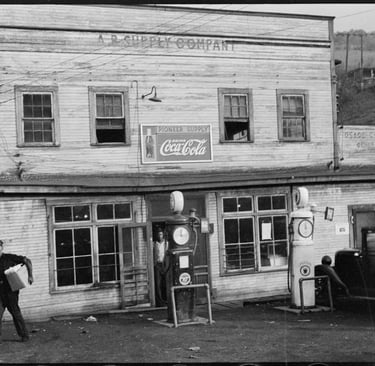Ismene and Real Life
Influences on Ismene and the Voice. Today: Company towns.
BLOG


You load 16 tons, what do you get?
Another day older and deeper in debt
St. Peter, don't you call me 'cause I can't go
I owe my soul to the company store
--Sixteen Tons, by Merle Travis
In the real world: company scrip
Scrip, in a broad sense, is money—but it is money issued by an isolated or disconnected system. It's an alternative to legal tender. Communities and organizations have issued scrip, and the US Army has used scrip to pay its personnel.
Company scrip (also called truck wages) is issued by a company to pay its workers. This practice has been used worldwide, especially as a part of company towns, and is currently illegal in some nations. In the 19th century and into the early 20th, some US lumber and coal companies paid their employees in scrip. This was theoretically beneficial to keep the local economy going; the company ran a company store, where employees could buy what they needed even if the area was otherwise isolated. However, this also allowed the company to ensure workers could only buy goods from the company-run store, allowing them to charge high prices and make high profits. Companies could also control the rate at which scrip could be changed for cash, effectively lowering wages and preventing employees from having the money to pay cheaper prices elsewhere. Coal companies offered advances on wages, which were paid in scrip and at a lower rate than their future cash value. This put workers in a 'payday loan' debt spiral, effectively debt slavery.
While scrip could be viewed as a way for companies to help employees in debt, for isolated workplaces to ensure a functioning economy, and for companies to make a higher profit, it prevented workers from moving elsewhere, slowed the growth of local economies, and enriched companies at their workers' expense.
While companies profited from the use of scrip systems, the systems constitutes a form of worker exploitation. It allows for higher corporate profit margins, recapture of value from employees' pay, and a company monopoly on products sold in its company store.
Scrip has been illegal in the United Kingdom since 1725, and was outlawed in the US in 1938 (although its use continued in some states until 1967). Other value capture practices, such as fees levied on pay cards, are currently legal.
In Tyrene: token wages
Because Tyrenian workers do not have a right to earn money in coin, Tyrenian Houses have instituted systems of company scrip in the form of House-issued token coins. This has effectively created a two-currency economy, where House members enjoy a freedom of economic choice that workers do not, and a value disparity where Houses can control the value of goods and services that their workers receive. At the time of Ismene, this system is becoming more unbalanced and is opposed by a worker's rights movement, as well as by some House members (especially scholars).
Tyrenian Houses supply their workers with various goods in kind, and pay the rest of their wages in tokens. Many products and services are only available for purchase with cash money (by regulation, or custom), making them inaccessible to a worker. Houses sell lower-quality goods for tokens, but may not stock all the things a worker needs. Other Houses' products, where legal, can be bought at various inflated prices if that House accepts a worker's token type. Many Houses make deals with providers of goods and services to accept their workers' tokens at a more reasonable rate. These arrangements are considered to be workers' benefits and are much-spoken of in House publications.
There is a healthy underground token trade between Houses, where workers trade each others' tokens to gain access to products or services they could not otherwise get. This practice is not illegal, but many Houses search employees' quarters and confiscate non-wage tokens. Another House's tokens are not, after all, worker property. A House loses revenue options if its workers are paying premiums for someone else's token type, so they do not encourage moneychanging. On the other hand, a House that can accept profitable purchases in another House's token can use that currency to its benefit.
Tokens have cash value, as per Assembly law, but this does not allow workers access to cash. Cash money can be converted to and from tokens by House family members, who have access to banking services. While it is not illegal for workers to possess cash money, they do not have the legal right to spend it, and Houses strongly enforce punishments for 'theft'. Houses run their own internal token banks for their workers, capturing some value back through fees and fines.
The Guilds support the abolishment of tokens and the institution of single-currency cash wages. By the end of Ismene, some Houses have effectively begun a cash wage policy, and the future Councils are making this practice law.
An A&P chain store in Osage, WV. According notes on this photo, flour at this store cost half (in dollars) what it cost at the company store (in scrip). There are coins still extant from the AB Supply Company from this region.